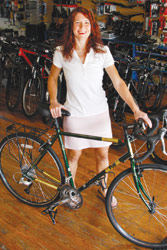High gasoline prices are putting the squeeze on consumers and businesses alike. But for bike retailers and repair shops here and elsewhere, these are the salad days.

Marty Gallagher, who owns Pro Bikes in West Asheville, has a dilemma on her hands. On the one hand, the 30-something owner has little personal time anymore to indulge her own passions—including stress-relieving bike rides—because of the incredible jump in business. On the other hand, she’s making money hand over fist selling new bikes and accessories. That’s on top of repairing people’s old bikes that have suddenly gained favor over automobiles for quick errands and short trips, as gas prices hover around $4 per gallon with no relief in sight.
She’s not alone. Ryan Burns, the sales manager at Cash Converters, says, “We’re having killer days.” The Merrimon Avenue shop sells used bikes and sundry other items.
Gallagher, who worked at Pro Bikes for several years before buying the Haywood Road business three years ago, has never seen it like this. Bike sales have at least doubled since gas prices shot up, she says.
“It started getting intense right around the middle of April, when the weather started to get warm,” she explains. “That’s normal, but it’s been easily double—double the amount of traffic, double the amount of sales, double the amount of everything that it has been for the last three years. Probably even more than that.”
But success, she says, is not without a cost. Where before she had two mechanics, she’s had to hire three more, plus a full-time salesperson—and the mechanics are also called upon to double as salespeople when needed. Increased sales also mean having to buy more to keep her store stocked. Even with the increased work force, notes Gallagher, she’s still understaffed.
“It’s definitely a lot at once,” she says about the whole experience, which she describes as hard but in a good way. “I’m excited about the growth, but it’s just learning to manage the growth. … This has just kind of come out of nowhere. Doubling your numbers from the previous year is a pretty big deal. I mean, I don’t even have enough room for the number of employees I need. They’re not just doing repairs; they also have to do the builds of the new bikes coming in, which are also selling out the door. There’s actually three bikes out there right now that are sold and all of them have to be built, but [the mechanics] are still doing repairs.”
Like many local bike stores, Pro Bikes offers models ranging from a few hundred dollars to several thousand, not including add-ons or customization. In the past, the typical client was a bike enthusiast. Now, people who haven’t ridden a bike in years—or who never would have thought to use one other than for leisure or exercise—are flocking to the shop.
A scan of national news stories suggests that the phenomenon is widespread, especially in cities that have invested in bike-friendly infrastructure such as designated lanes, trails and lockers—many of which are called for by the city’s recently adopted Comprehensive Bicycle Plan.
“I can see there is more growth in Asheville and more people, and that sales would go up a little bit,” says Gallagher. “But the truth is, as drastic as [the increase] is, it’s got to be gas prices.” If more evidence were needed, the heavy traffic in bike sales and repairs has been matched by an explosion in sales of commuter items such as racks, locks, baskets and panniers, according to both Gallagher and Youngblood Haske of Youngblood Bicycles in north Asheville.
On one recent day, Cash Converters had fewer bikes than usual, according to Burns. “We usually have two or three more racks with two bikes each, so four to six more [adult] bikes out there at one time. In the last week, they’ve all sold.”
Another indication that bikes are gaining popularity is that folks are holding on to their bikes, rather than selling them to Cash Converters. “We haven’t been buying as many as we’ve been selling, at least in the last week or two; our stock is depleted,” says Burns.
Haske, who’s been in business for about three years, reports a slightly different picture. Although repairs and sales of accessories are up, bike sales are down a bit; overall, however, the store’s gross receipts have increased compared with previous years. One reason for the dip in bike sales, he says, may simply be that people have less money to spend.
Notwithstanding the gas savings, some people might not be prepared to plunk down hundreds of dollars for a good bike right now without a quicker return on their investment. Even his core clientele—serious bike enthusiasts—are cutting back on purchases, notes Haske, since ferrying their bikes by car to Bent Creek and other local trails eats fuel and precious dollars.
“I think in some ways, gas prices have hurt bike shops more than it’s helped,” he says. “Because people just have less money in their pockets, and they’re buying less gear. The bike enthusiasts can’t buy a new high-end bike, because they’re spending that money on gas.” On the other hand, among regular folks with more utilitarian needs, “We are definitely seeing a surge in commuter business.”



Before you comment
The comments section is here to provide a platform for civil dialogue on the issues we face together as a local community. Xpress is committed to offering this platform for all voices, but when the tone of the discussion gets nasty or strays off topic, we believe many people choose not to participate. Xpress editors are determined to moderate comments to ensure a constructive interchange is maintained. All comments judged not to be in keeping with the spirit of civil discourse will be removed and repeat violators will be banned. See here for our terms of service. Thank you for being part of this effort to promote respectful discussion.